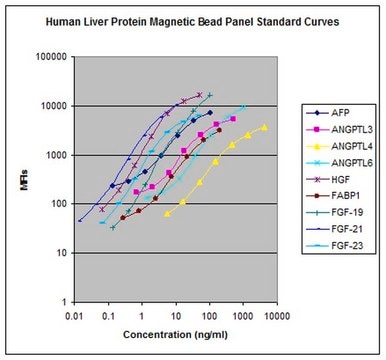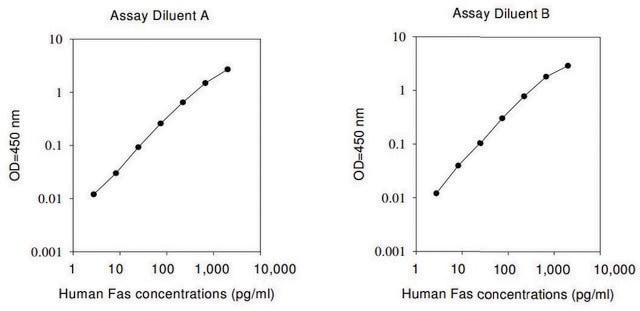CKT2MAG-97K
MILLIPLEX® Canine Kidney Toxicity Panel 2 - Toxicity Multiplex Assay
The analytes available for this multiplex kit are: Albumin, β-2-microglobulin (B2M), Trefoil Factor 3 (TFF-3), Retinol Binding Protein 4 (RBP4)
About This Item
Empfohlene Produkte
Qualitätsniveau
Speziesreaktivität
canine
Hersteller/Markenname
Milliplex®
assay range
accuracy: 96-102%
sensitivity: 0.016-0.026 ng/mL
(All other analytes; MinDC +2SD)
sensitivity: 12.48 ng/mL
(Albumin; MinDC +2SD)
standard curve range: 0.01-50 ng/mL
(RBP4)
standard curve range: 0.02-100 ng/mL
(B2M)
standard curve range: 0.02-100 ng/mL
(TFF-3)
standard curve range: 12.21-50,000 ng/mL
(Albumin)
Methode(n)
multiplexing: suitable
Nachweisverfahren
fluorometric (Luminex xMAP)
Versandbedingung
wet ice
Allgemeine Beschreibung
MILLIPLEX® Canine Kidney Toxicity Panel 2 is a 4-plex kit to be used for the simultaneous quantification of any combination of the following analytes in canine urine samples: Albumin*, β-2-microglobulin (B2M)*, Trefoil Factor 3 (TFF-3)*, Retinol Binding Protein 4 (RBP4)*. This kit uses a 96-well format, contains a lyophilized standard cocktail, two internal assay quality controls and can measure up to 38 samples in duplicate.
*Urinary albumin, B2M, TFF-3 and RBP4 are biomarkers listed in the Predictive Safety Testing Consortium (PSTC) project pipeline which have a strong translational role in drug safety testing.
The Luminex® xMAP® platform uses a magnetic bead immunoassay format for ideal speed and sensitivity to quantitate multiple analytes simultaneously, dramatically improving productivity while conserving valuable sample volume.
Panel Type: Toxicity
Spezifität
Approximately 5% cross-reactivity may be observed between B2M beads and TFF-3 protein. No other significant cross-reactivity was observed for other analytes in this panel.
Anwendung
- Analytes: Albumin, β-2-Microglobulin (B2M), Trefoil Factor 3 (TFF-3), Retinol Binding Protein 4 (RBP4)
- Recommended Sample Type: Canine urine
- Recommended Sample Dilution: 25 μL of 1:500 diluted canine urine for normal subjects; optimal dilutions for disease subjects should be determined
- Assay Run Time: Primary incubation of 2 hours, followed by a secondary incubation of 1 hour, both at room temperature (20-25°C)
- Research Category: Toxicology
Leistungsmerkmale und Vorteile
Komponenten
Canine Kidney Toxicity Panel 2 Control 1, 1 vial, lyophilized
Canine Kidney Toxicity Panel 2 Control 2, 1 vial, lyophilized
Assay Buffer, 2 bottles, 30 mL
Wash Buffer, 10X (0.05% Proclin), 2 bottlesl, 30 mL
Canine Kidney Toxicity Panel 2 Detection Antibodies, 1 bottle, 5.5 mL
Streptavidin-Phycoerythrin, 1 bottle, 5.5 mL
Mixing Bottle, 1 bottle
Sample Plate, 96 well format, 1 plate
2 Foil Plate Sealers
Sonstige Hinweise
Rechtliche Hinweise
Signalwort
Danger
Gefahreneinstufungen
Acute Tox. 3 Dermal - Acute Tox. 4 Inhalation - Acute Tox. 4 Oral - Aquatic Chronic 2 - Eye Dam. 1 - Skin Sens. 1 - STOT RE 2
Zielorgane
Respiratory Tract
Lagerklassenschlüssel
6.1C - Combustible acute toxic Cat.3 / toxic compounds or compounds which causing chronic effects
Analysenzertifikate (COA)
Suchen Sie nach Analysenzertifikate (COA), indem Sie die Lot-/Chargennummer des Produkts eingeben. Lot- und Chargennummern sind auf dem Produktetikett hinter den Wörtern ‘Lot’ oder ‘Batch’ (Lot oder Charge) zu finden.
Besitzen Sie dieses Produkt bereits?
In der Dokumentenbibliothek finden Sie die Dokumentation zu den Produkten, die Sie kürzlich erworben haben.
Verwandter Inhalt
Multiplex kidney toxicity assays detect nephrotoxicity biomarkers in small samples, minimizing time and costs for toxicity screening.
Discover benefits of using biomarker detection multiplex immunoassays for companion and agricultural animal health research and find vet med multiplex assays.
UnEnhance research with MILLIPLEX® multiplexing tips, industry guidance, and one-day assays for limited lab time.
MILLIPLEX® toxicity assays advance liver, kidney, and genotoxicity research by simultaneously measuring multiple toxicity biomarkers.
Unser Team von Wissenschaftlern verfügt über Erfahrung in allen Forschungsbereichen einschließlich Life Science, Materialwissenschaften, chemischer Synthese, Chromatographie, Analytik und vielen mehr..
Setzen Sie sich mit dem technischen Dienst in Verbindung.










